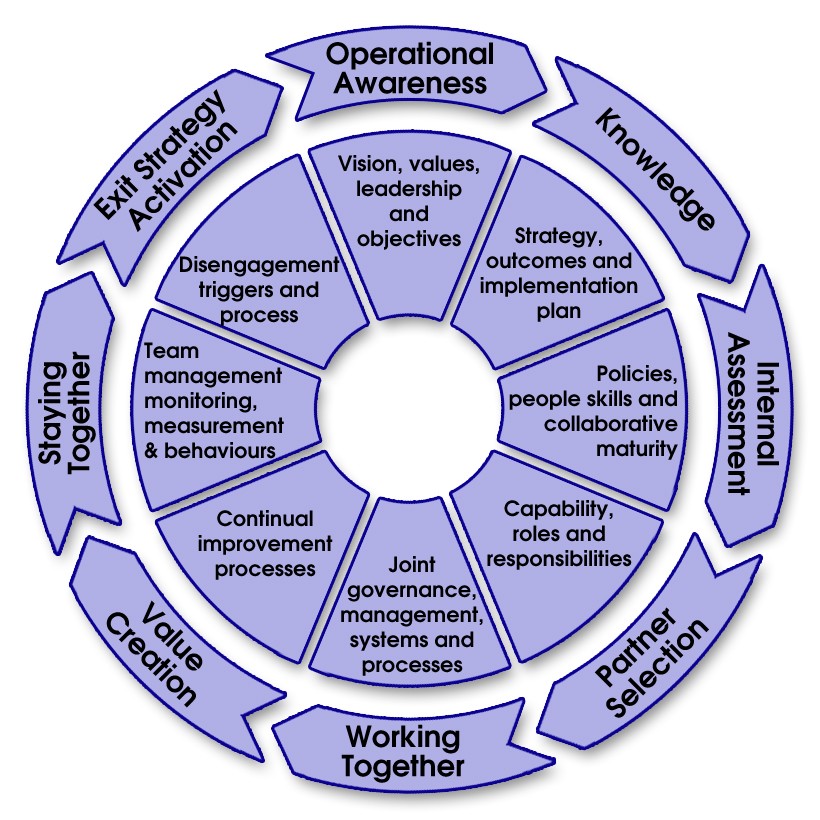As Business Arrangements Become More Complex, Achieving Optimum Sustainable Performance Requires Flexibility, Adaptivity, and Increased Collaboration.
It is no secret that the many complex public–private and public-public business arrangements fall short of meeting stakeholder expectations. The single leading cause of failure is that complex, long term agreements are structured and managed as static transactions or deals, and therefore do not adapt well to change and evolution. By positioning the relationship among stakeholders at the heart of delivery, oversight and performance management, business arrangements are structured and managed as collaborative and adaptive system that drive change and achieve improved outcomes with lower risk.
This half-day Executive program will provide Executives with the need to know essentials for managing adaptive, flexible and collaborative business relationships. The program will provide a high level guide to implementing and operationalizing the ISO 44001 standard for collaborative business relationships in existing and new relationships and for building the required capacity and skills necessary to enable change and create a culture of collaboration and trust.
THE RELATIONAL MODEL – AN ISO STANDARD
The Relational model of Management supports the development and management of an adaptive business relationship among partners, with whom collaboration and ongoing alignment is critical to achieving overarching common objectives. The Framework operationalizes ISO 44001, which was approved in Dec 2016 and published in early 2017, from the both perspectives of the internal policy and governance readiness to collaborate and in terms of establishing specific relationship management plans with strategic partners.
supports the development and management of an adaptive business relationship among partners, with whom collaboration and ongoing alignment is critical to achieving overarching common objectives. The Framework operationalizes ISO 44001, which was approved in Dec 2016 and published in early 2017, from the both perspectives of the internal policy and governance readiness to collaborate and in terms of establishing specific relationship management plans with strategic partners.
WHO SHOULD ATTEND
This training program is recommended for public and private sector leadership team and owner of complex programs
LEARNING OBJECTIVES
- Gain insight into the issues and challenges associated with managing complex business relationships;
- Internalize the difference between individual relationships and relationship management as a system and a platform for outcome improvement;
- Learn about the definitive framework for best practices relationship management – the ISO 44001 international standard;
- Learn about Relationship Charters, Joint Governance and, collaborative competencies development systems;
- Learn about the necessary tools to establish and operationalize relationships management frameworks in diverse stakeholder environments;
- Learn how to objectively assess relationship fit and partner capability, in relation to desired in the planning, sourcing, negotiations or management of complex business arrangements.
- Learn how to effectively construct and apply relational contract principles within a public sector procurement regime;
- Learn how to form and activate high performing joint teams within a mutually shared environment of trust and collaboration;
- Gain knowledge into the necessary capability requirements to implement ISO 44001 and manage culture change.
PROGRAM TAKEAWAYS
Participants will develop a “total system” understanding of the critical role of “Relationship Management as a System” in achieving success in complex business arrangements with emphasis on the “Executive role” in leading the change.
AGENDA
Part I – Introduction: Macro & micro view of relationships management in the public and private sectors
- A global perspective on relationships i.e. public-public, public-private and where they are headed
- Understanding the differences between micro and macro relationships
- Relationship scalability beyond acute circumstance
Part II – Relationship Management Framework
- Overview of the Relationship-based model of Management, ISO 44001/02
- Introduction to Corporate Relationship Management Plans and Relationship Charters
- An adaptive platform for collaborative working, outcome realization and performance improvement
Part III – Facilitated Dialogue on Implementation
- How do we implement relationship management frameworks in existing relationships and as well as new programs or initiatives?
- How do we ensure stakeholder commitment and active participation?
- How do we work in teams, get rid of the “us versus them” and initiate a behavioural change process?
- What are the key implementation challenges?
Part IV – Round Table
- Attendees Feedback and Takeaways
LEAD FACILITATOR

Andy Akrouche
FACILITATORS

Monty Mukerji

Jon Hansen

